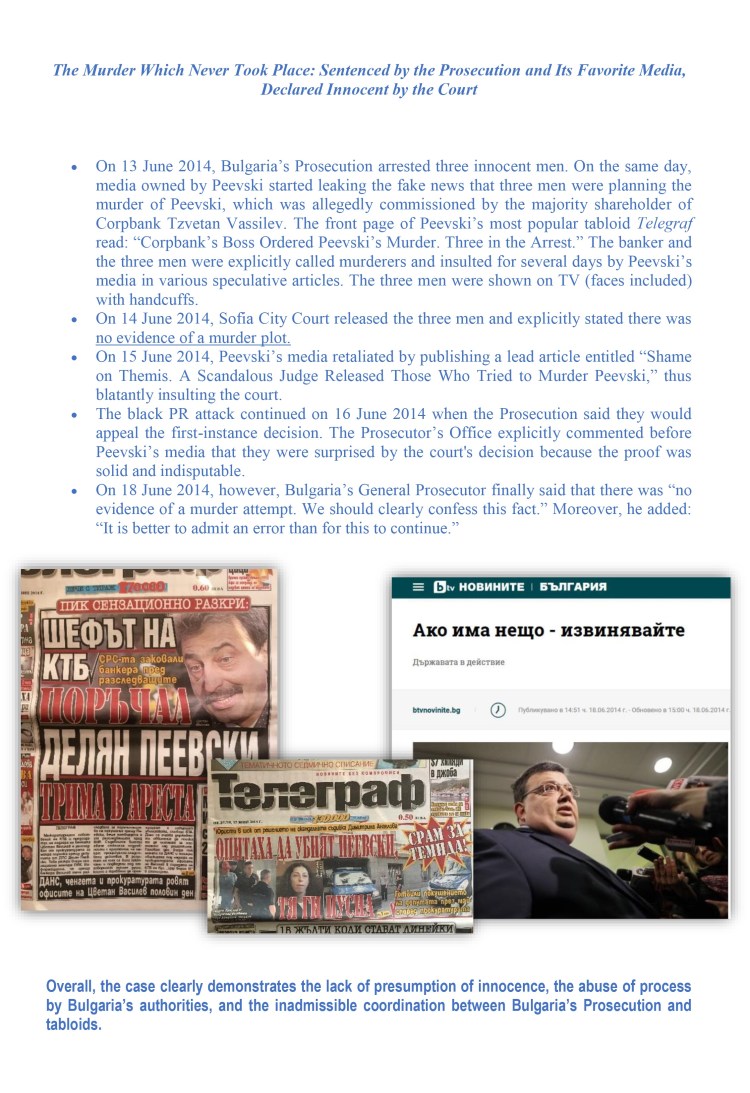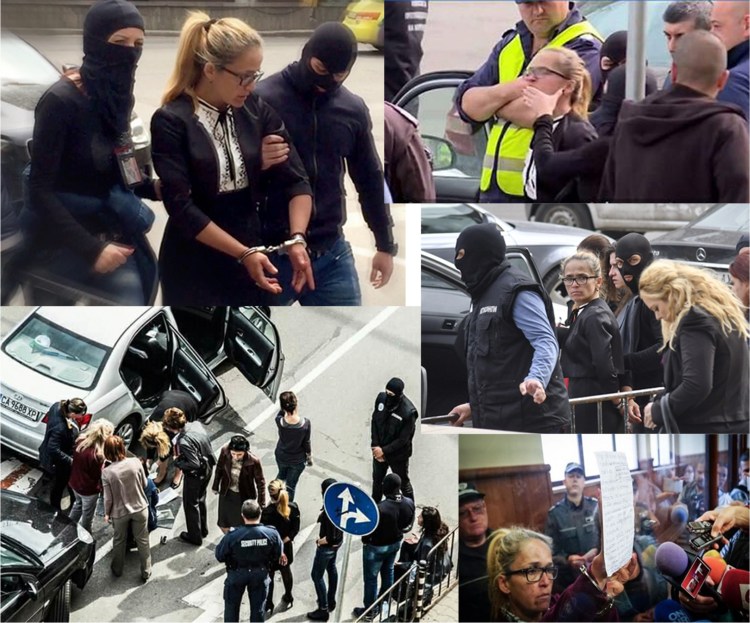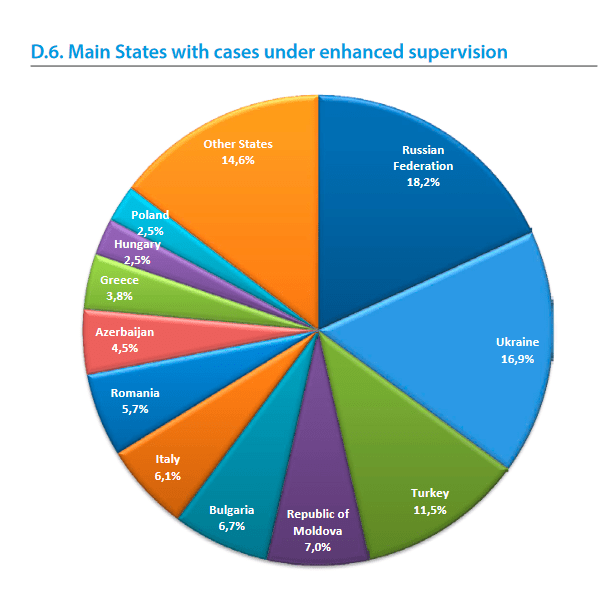“Bulgaria’s Prosecution applies Bulgarian law according to which the guilty ones become accused and that is the purpose of criminal proceedings.”[1] Sadly, this was a comment before the media made by Bulgaria’s General Prosecutor Sotir Tsatsarov in light of an accusation Bulgaria’s Prosecutor’s Office raised in 2017.
Bulgaria is an EU member and a signatory to the European Convention on Human Rights. However, haunted by totalitarian tradition, Bulgaria’s Prosecutor’s Office applies a presumption of guilt – a major abuse of fundamental rights, which has severe consequences for suspects and accused alike.
Certainly, the presumption of innocence is not optional. Not only it is a fundamental principle of the criminal laws of modern democracies, but also it is enshrined in Article 6(2) of the European Convention on Human Rights and Article 48 of the EU Charter of Fundamental Rights. In 2016, to reinforce the principle, the European Union enacted Directive 2016/343 on the strengthening of certain aspects of the presumption of innocence and of the right to be present at the trial in criminal proceedings.
In a nutshell, the principle requires that everyone be presumed innocent until proven guilty in a legitimate court and after a fair trial. In addition, it means that the burden of proof is on the authorities making the accusation: they have to prove that an accused person is guilty in court. It also requires authorities to take care not to prejudice a suspect or an accused person by making public statements about their guilt before a court has handed down a decision.
The Presumption of Guilt: A Key Principle of Bulgaria’s Prosecutor’s Office
The statement by the General Prosecutor cited above is the rule rather than the exception. The totalitarian philosophy of depriving accused people of fundamental rights has been embraced wholeheartedly by other members of the General Prosecutor’s team, too. In 2014, for instance, Bulgaria’s Deputy General Prosecutor Borislav Sarafov prejudiced an accused person in an interview by stressing that the fact that the accused argued he had not committed a crime was irrelevant. Sarafov reversed the burden of proof by emphasizing that “[the accused] has to prove his innocence in court.”[2]
Such statements violate Article 6(2) of the European Convention on Human Rights and Article 48 of the EU Charter of Fundamental Rights. They are also problematic in light of Article 3, Article 4(1), and Article 6 of the new Directive 2016/343:
Article 3
Presumption of innocence
Member States shall ensure that suspects and accused persons are presumed innocent until proved guilty according to law.
Article 4
Public references to guilt
Member States shall take the necessary measures to ensure that, for as long as a suspect or an accused person has not been proved guilty according to law, public statements made by public authorities, and judicial decisions, other than those on guilt, do not refer to that person as being guilty…
Article 6
Burden of proof
Member States shall ensure that the burden of proof for establishing the guilt of suspects and accused persons is on the prosecution. This shall be without prejudice to any obligation on the judge or the competent court to seek both inculpatory and exculpatory evidence, and to the right of the defense to submit evidence in accordance with the applicable national law.
Member States shall ensure that any doubt as to the question of guilt is to benefit the suspect or accused person, including where the court assesses whether the person concerned should be acquitted.
With the presumption of guilt comes the media trial in outlets, which collaborate with Bulgaria’s Prosecutor’s Office. In addition to being presumed guilty, a person may receive a verdict way before a trial has even started.
Media Trials and Spectacular Arrests
In Bulgaria, the relationship between the media and the Prosecutor’s Office is quite peculiar. In their latest report on Bulgaria, Freedom House underscored: “Due to the structure of Bulgaria’s judicial system, the prosecution has had a monopoly on the investigative process, potentially leading to abuses in communications with the media on high-profile cases. In 2017, the prosecution’s spokesperson provided selective information to the public throughout the year, effectively accusing people before the start of trials.”
Troublesome as it looks, this is actually an understatement of the problem. Most media are controlled by Delyan Peevski who many believe has extensive influence over the Prosecutor’s Office. Reporters Without Borders called his media “baseball bats” because they are used to target inconvenient opponents. The reputable organization ranked Bulgaria 111th in the world based on freedom of speech in their World Press Freedom Index, way behind failed states in Asia and in Africa, because of his media.
Not only people can learn about their future accusations from his tabloids before they receive a subpoena by the authorities, but the Prosecution often relies on articles from such tabloids as proof of someone’s guilt at the trial stage. Moreover, even before a person has an indictment in court, prosecutors start giving interviews and asserting the person’s guilt in the media. The purpose is not benign! The goal is to have a media trial which can manipulate public opinion, put pressure on the court, or even discredit it if it dares to question the proof provided by the prosecutors.
One of the most striking examples of the symbiosis between the Prosecutor’s Office and tabloids is provided by the so-called Peevski’s “murder,” which never took place. Three innocent men were arrested on 13 June 2014 and declared guilty by the media and the Prosecution despite the lack of any evidence, as later established by the Bulgarian court (the facts are summarized in Figure 1 below). The Prosecutor’s Office argued they had solid and undisputed proof that these people were guilty before the media, but much later the General Prosecutor Sotir Tsatsarov admitted the Prosecution made a mistake.[3] Yet, such mistakes are neither acceptable in a country governed by the rule of law nor compatible with the European Convention on Human Rights. Bulgaria has lost plenty of cases before the European Court of Human Rights because of show arrests and abuse of process. A well-known case of abuse is Popovi v Bulgaria.
-
 Figure 1: Spectacular arrests and abuse of process: a trend mark of Bulgaria’s Prosecutor’s Office
Figure 1: Spectacular arrests and abuse of process: a trend mark of Bulgaria’s Prosecutor’s Office
A more recent shocking example of the unhealthy collaboration between the Prosecutor’s Office and dependent media was a spectacular show arrest of a mayor carried out in broad daylight in the center of Sofia, Bulgaria’s capital. The arrest was broadcast live by a TV station affiliated with Peevski, mentioned above. Moreover, the mayor was left in hand-cuffs for 5 hours, so a series of pictures appeared in most Bulgarian print and online media (Figure 2). In addition to violating the European Convention on Human Rights, such arrests clearly breach a number of provisions of Directive 2016/343, including its
Article 5
Presentation of suspects and accused persons
1. Member States shall take appropriate measures to ensure that suspects and accused persons are not presented as being guilty, in court or in public, through the use of measures of physical restraint.
In line with their unhealthy habit, Bulgaria’s authorities were quick to assert the person’s guilt and “sentence” her, too. While Bulgaria’s Minister of Foreign Affairs (former Minister of Justice) publicly commented that such arrests were incompatible with the presumption of innocence, Bulgaria’s General Prosecutor Sotir Tsatsarov quickly responded that “If the message to us is that there is a boundary that we should not cross, obviously there is a complete discrepancy between the official statements against corruption made by the government and their real expectations.” In other words, Bulgaria’s Prosecution considers the European Convention on Human Rights and Directive 2016/343 to be optional. To prove their point, they made sure the accused person was photographed in handcuffs and behind a glass window, which prevented her from speaking to the media, when she appeared for her hearing on her mandatory measure several days later (Figure 2).

-
Figure 2: A show arrest in broad daylight in April 2018. The person was kept in handcuffs for 5 hours, so that media could take pictures. When she tried to protest that she did not have access to a lawyer, as required by law, authorities literally shut her mouth. A few days later, when she arrived for a hearing about her detention measure, she was kept in handcuffs and behind a glass window, so that she had difficulty communicating with the media; Sources of pictures from the upper left corner clockwise: 1) BNT 2) Eurochicago 3) Dir.bg 4) Eurochicago 5) Nova TV
Renounce Your Rights!
Once Bulgaria’s Prosecutor’s Office accuses someone, not only it declares them guilty, but also it expects them to renounce their procedural rights. The Prosecution does not shy away from making prejudicing statements about those who exercise their rights and about their defense counsel.
For example, the Head of Bulgaria’s Specialized Prosecution Ivan Geshev made a series of statements before the media prejudicing an accused person who was contesting the grounds of an extradition request sent by Bulgaria. It is also important to note that in the given case extradition is sought on the basis of an arrest warrant whose legality has been contested by the accused person before the European Court of Human Rights.
In December 2017, however, Prosecutor Ivan Geshev argued that if the accused was a person acting in good faith, he would not contest the grounds of extradition, but return to Bulgaria.[4] In February 2018, the same prosecutor accused him of not being a real man because he was fighting extradition: “So what would happen if he gets arrested? I thought he was a man, I suppose he is not a lady.”[5] In March 2018, he even dared accuse the same person of abusing his procedural rights because he was fighting extradition.[6] In other words, the person was blamed for exercising his procedural rights.
Moreover, in the summer of 2017, Bulgaria’s General Prosecutor Sotir Tsatsarov attacked the defense of the same accused person because the attorneys had commented that the accusation itself was absurd.[7] “Of course they would say this. This is what they are paid for,” he asserted. Moreover, he emphasized: “His counsel does not defend a public cause…These people are getting paid to defend an accused person.”[8]
Such public statements can easily be seen as an attempt to assert superiority and as an attack both on the right to defense and the principle of equality of arms in criminal proceedings.
How is this possible in an EU member?
Undoubtedly, the practices of Bulgaria’s Prosecutor’s Office are not compatible with the idea of rule of law. In fact, it is important to emphasize that despite its small size, Bulgaria is a top 5 violator of the European Convention on Human Rights, as evident from the annual report of the European Court of Human Rights. In addition, Bulgaria is a champion of not enforcing decisions by the European Court of Human Rights: 6.7% of the cases put under enhanced supervision by the court are from Bulgaria, too (Figure 3). Furthermore, out of the 588 cases Bulgaria has lost since 1992 when it ratified the European Convention on Human Rights, 280 (or 48%) concern violations of Article 6 of the Convention (the right to fair trial, including the respect for the presumption of innocence).

-
Figure 3: Bulgaria is a leader in not enforcing decisions by the European Court of Human Rights. 6.7% of the decisions under enhanced supervisions are from Bulgaria. It should be noted that the number is exceptionally high considering the population of Bulgaria (ca 7.2 million). Compare with the population of Russia (ca 120 million) and Turkey (ca 80 million); Source of graph: Annual Report of the Committee of Ministers 2017, p. 75
Bulgaria’s Prosecutor’s Office has a vertical, Stalinist structure where all decisions depend entirely on the General Prosecutor who is not accountable to anyone for his actions. The Venice Commission has emphasized: “The Soviet model of the prosecution must be decisively turned down. It turns it into a source of corruption and blackmail and creates opportunities for its use for political aims.” The Council of Europe has repeatedly called for a reform to no avail in light of the consistent abuses identified by the European Court of Human Rights. The latest reminder is a resolution of the Committee of Ministers of the Council of Europe from March 2018.
Yet, nothing has been done to target the heart of the problem. This, sadly, is not surprising considering the persistent downfall of Bulgaria’s democracy. As noticeable from the graph by Freedom House below, Bulgaria’s democratic deficit has been steadily worsening since 2008 – in fact, the reputable think tank no longer considers Bulgaria a full (consolidated) democracy (Figure 4).
Ultimately, the question, which is left unanswered, is why the European Commission has been turning a blind eye to all these problems despite its obligation to be the Guardian of the Treaties and to ensure the respect of fundamental rights when a Member State obviously fails at complying with its obligations under the Treaties.

-
Figure 4: According to data by Freedom House, Bulgaria’s democracy has progressively deteriorated. The decline started in 2008 and the country reached its all time low in the ranking in 2018 when Freedom House declared it a semi-consolidated democracy; Source of graph: Nations in Transit Report 2018
============================================================================
If interested in the #RuleOfLaw and #HumanRights in the EU, you can also read the following blog posts:
- The Rise of Modern European Dictatorships and EU’s Dual Standards on Human Rights
- Hell Is Closer than the EU Thinks: On Torture and Other Human Rights Abuses in Bulgarian Custodial and Detention Facilities
- On How Bulgaria’s Corrupt Authorities Abuse Interpol’s Red Notice for Violent Political Vendettas
- Criminal Corporate Raiding in Bulgaria
- All You Need to Know About Bulgaria’s Rule of Law in 10 Charts
Follow me on Twitter @radosveta_vass
Follow me on YouTube: https://www.youtube.com/c/RadosvetaVassileva
==============================================================================
[1] 31 August 2017, Dnevnik, “Цацаров: Лична вендета в Наказателния кодекс няма (допълнена)”
[2] 20 August 2014, Praven svyat, “Борислав Сарафов: Цв. Василев да докаже в съда, че е невинен”
[3] 18 June 2014, Sofia Globe, “Bulgarian prosecutors backtrack on ‘murder plot’ against Peevski”
[4] 13 December 2017, 24 Chasa, “Иван Гешев: Ако Цветан Василев е добросъвестен, да се яви пред съда”
[5] 27 February 2018, Dnevnik, “Съдът прие, че Цветан Василев е призован редовно, и даде начало на делото КТБ (допълнена в 15:13 ч.)”
[6] 15 March 2018, Epicenter, “Прокурор Иван Гешев: Цветан Василев злоупотребява с процесуалните си права”
[7] 21 June 2017, Trud, “Сотир Цацаров: Адвокатите на Цветан Василев не са мерило за надеждността на обвинението”
[8] Ibid.

10 thoughts on “Spectacular Televised Arrests, Media Trials, and Abuse of Process: The Presumption of Guilt in Bulgaria”
Comments are closed